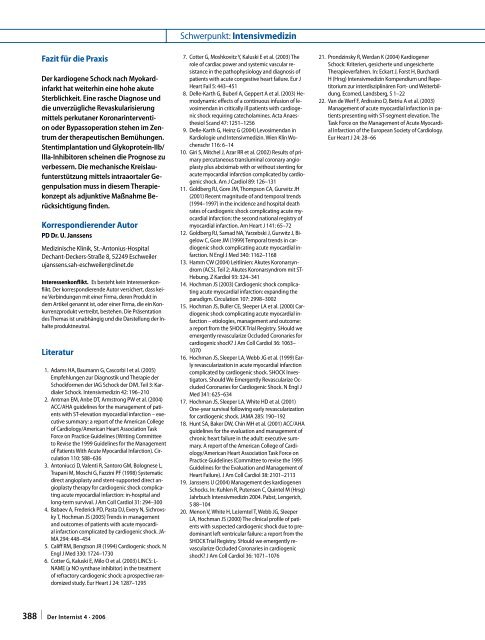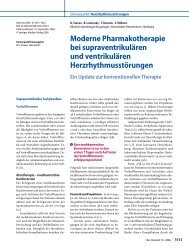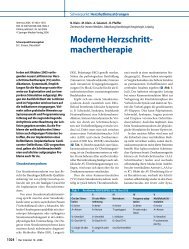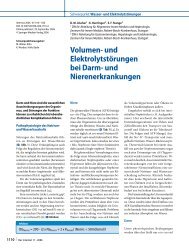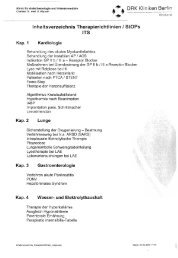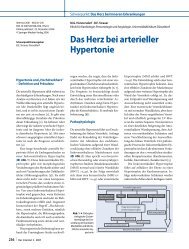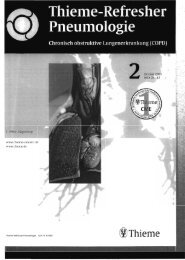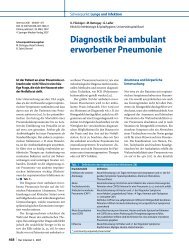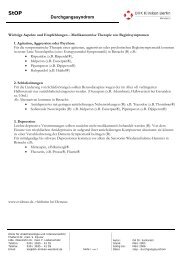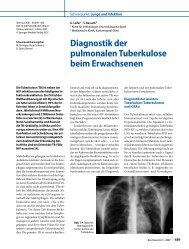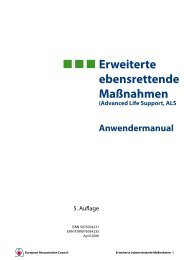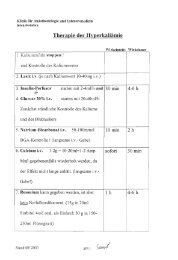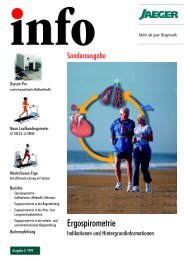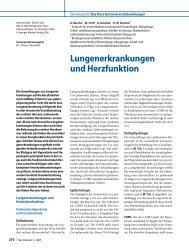Infarktbedingter kardiogener Schock - Erkan Arslan
Infarktbedingter kardiogener Schock - Erkan Arslan
Infarktbedingter kardiogener Schock - Erkan Arslan
Sie wollen auch ein ePaper? Erhöhen Sie die Reichweite Ihrer Titel.
YUMPU macht aus Druck-PDFs automatisch weboptimierte ePaper, die Google liebt.
Fazit für die Praxis<br />
Der kardiogene <strong>Schock</strong> nach Myokardinfarkt<br />
hat weiterhin eine hohe akute<br />
Sterblichkeit. Eine rasche Diagnose und<br />
die unverzügliche Revaskularisierung<br />
mittels perkutaner Koronarintervention<br />
oder Bypassoperation stehen im Zentrum<br />
der therapeutischen Bemühungen.<br />
Stentimplantation und Glykoprotein-IIb/<br />
IIIa-Inhibitoren scheinen die Prognose zu<br />
verbessern. Die mechanische Kreislaufunterstützung<br />
mittels intraaortaler Gegenpulsation<br />
muss in diesem Therapiekonzept<br />
als adjunktive Maßnahme Berücksichtigung<br />
finden.<br />
Korrespondierender Autor<br />
PD Dr. U. Janssens<br />
Medizinische Klinik, St.-Antonius-Hospital<br />
Dechant-Deckers-Straße 8, 52249 Eschweiler<br />
ujanssens.sah-eschweiler@clinet.de<br />
Interessenkonflikt. Es besteht kein Interessenkonflikt.<br />
Der korrespondierende Autor versichert, dass keine<br />
Verbindungen mit einer Firma, deren Produkt in<br />
dem Artikel genannt ist, oder einer Firma, die ein Konkurrenzprodukt<br />
vertreibt, bestehen. Die Präsentation<br />
des Themas ist unabhängig und die Darstellung der Inhalte<br />
produktneutral.<br />
Literatur<br />
1. Adams HA, Baumann G, Cascorbi I et al. (2005)<br />
Empfehlungen zur Diagnostik und Therapie der<br />
<strong>Schock</strong>formen der IAG <strong>Schock</strong> der DIVI. Teil 3: Kardialer<br />
<strong>Schock</strong>. Intensivmedizin 42: 196–210<br />
2. Antman EM, Anbe DT, Armstrong PW et al. (2004)<br />
ACC/AHA guidelines for the management of patients<br />
with ST-elevation myocardial infarction – executive<br />
summary: a report of the American College<br />
of Cardiology/American Heart Association Task<br />
Force on Practice Guidelines (Writing Committee<br />
to Revise the 1999 Guidelines for the Management<br />
of Patients With Acute Myocardial Infarction). Circulation<br />
110: 588–636<br />
3. Antoniucci D, Valenti R, Santoro GM, Bolognese L,<br />
Trapani M, Moschi G, Fazzini PF (1998) Systematic<br />
direct angioplasty and stent-supported direct angioplasty<br />
therapy for cardiogenic shock complicating<br />
acute myocardial infarction: in-hospital and<br />
long-term survival. J Am Coll Cardiol 31: 294–300<br />
4. Babaev A, Frederick PD, Pasta DJ, Every N, Sichrovsky<br />
T, Hochman JS (2005) Trends in management<br />
and outcomes of patients with acute myocardial<br />
infarction complicated by cardiogenic shock. JA-<br />
MA 294: 448–454<br />
5. Califf RM, Bengtson JR (1994) Cardiogenic shock. N<br />
Engl J Med 330: 1724–1730<br />
6. Cotter G, Kaluski E, Milo O et al. (2003) LINCS: L-<br />
NAME (a NO synthase inhibitor) in the treatment<br />
of refractory cardiogenic shock: a prospective randomized<br />
study. Eur Heart J 24: 1287–1295<br />
388 | Der Internist 4 · 2006<br />
Schwerpunkt: Intensivmedizin<br />
7. Cotter G, Moshkovitz Y, Kaluski E et al. (2003) The<br />
role of cardiac power and systemic vascular resistance<br />
in the pathophysiology and diagnosis of<br />
patients with acute congestive heart failure. Eur J<br />
Heart Fail 5: 443–451<br />
8. Delle-Karth G, Buberl A, Geppert A et al. (2003) Hemodynamic<br />
effects of a continuous infusion of levosimendan<br />
in critically ill patients with cardiogenic<br />
shock requiring catecholamines. Acta Anaesthesiol<br />
Scand 47: 1251–1256<br />
9. Delle-Karth G, Heinz G (2004) Levosimendan in<br />
Kardiologie und Intensivmedizin. Wien Klin Wochenschr<br />
116: 6–14<br />
10. Giri S, Mitchel J, Azar RR et al. (2002) Results of primary<br />
percutaneous transluminal coronary angioplasty<br />
plus abciximab with or without stenting for<br />
acute myocardial infarction complicated by cardiogenic<br />
shock. Am J Cardiol 89: 126–131<br />
11. Goldberg RJ, Gore JM, Thompson CA, Gurwitz JH<br />
(2001) Recent magnitude of and temporal trends<br />
(1994–1997) in the incidence and hospital death<br />
rates of cardiogenic shock complicating acute myocardial<br />
infarction: the second national registry of<br />
myocardial infarction. Am Heart J 141: 65–72<br />
12. Goldberg RJ, Samad NA, Yarzebski J, Gurwitz J, Bigelow<br />
C, Gore JM (1999) Temporal trends in cardiogenic<br />
shock complicating acute myocardial infarction.<br />
N Engl J Med 340: 1162–1168<br />
13. Hamm CW (2004) Leitlinien: Akutes Koronarsyndrom<br />
(ACS). Teil 2: Akutes Koronarsyndrom mit ST-<br />
Hebung. Z Kardiol 93: 324–341<br />
14. Hochman JS (2003) Cardiogenic shock complicating<br />
acute myocardial infarction: expanding the<br />
paradigm. Circulation 107: 2998–3002<br />
15. Hochman JS, Buller CE, Sleeper LA et al. (2000) Cardiogenic<br />
shock complicating acute myocardial infarction<br />
– etiologies, management and outcome:<br />
a report from the SHOCK Trial Registry. SHould we<br />
emergently revascularize Occluded Coronaries for<br />
cardiogenic shocK? J Am Coll Cardiol 36: 1063–<br />
1070<br />
16. Hochman JS, Sleeper LA, Webb JG et al. (1999) Early<br />
revascularization in acute myocardial infarction<br />
complicated by cardiogenic shock. SHOCK Investigators.<br />
Should We Emergently Revascularize Occluded<br />
Coronaries for Cardiogenic Shock. N Engl J<br />
Med 341: 625–634<br />
17. Hochman JS, Sleeper LA, White HD et al. (2001)<br />
One-year survival following early revascularization<br />
for cardiogenic shock. JAMA 285: 190–192<br />
18. Hunt SA, Baker DW, Chin MH et al. (2001) ACC/AHA<br />
guidelines for the evaluation and management of<br />
chronic heart failure in the adult: executive summary.<br />
A report of the American College of Cardiology/American<br />
Heart Association Task Force on<br />
Practice Guidelines (Committee to revise the 1995<br />
Guidelines for the Evaluation and Management of<br />
Heart Failure). J Am Coll Cardiol 38: 2101–2113<br />
19. Janssens U (2004) Management des kardiogenen<br />
<strong>Schock</strong>s. In: Kuhlen R, Putensen C, Quintel M (Hrsg)<br />
Jahrbuch Intensivmedizin 2004. Pabst, Lengerich,<br />
S 88–104<br />
20. Menon V, White H, LeJemtel T, Webb JG, Sleeper<br />
LA, Hochman JS (2000) The clinical profile of patients<br />
with suspected cardiogenic shock due to predominant<br />
left ventricular failure: a report from the<br />
SHOCK Trial Registry. SHould we emergently revascularize<br />
Occluded Coronaries in cardiogenic<br />
shocK? J Am Coll Cardiol 36: 1071–1076<br />
21. Prondzinsky R, Werdan K (2004) Kardiogener<br />
<strong>Schock</strong>: Kriterien, gesicherte und ungesicherte<br />
Therapieverfahren. In: Eckart J, Forst H, Burchardi<br />
H (Hrsg) Intensivmedizin Kompendium und Repetitorium<br />
zur interdisziplinären Fort- und Weiterbildung.<br />
Ecomed, Landsberg, S 1–22<br />
22. Van de Werf F, Ardissino D, Betriu A et al. (2003)<br />
Management of acute myocardial infarction in patients<br />
presenting with ST-segment elevation. The<br />
Task Force on the Management of Acute Myocardial<br />
Infarction of the European Society of Cardiology.<br />
Eur Heart J 24: 28–66


